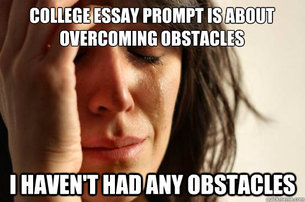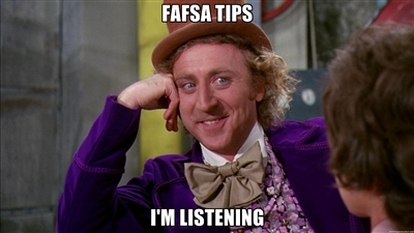Two weeks ago I issued a call for volunteers to answer 10 questions about their college applications experience. Thank you to the 80 of you who obliged - I sincerely appreciate it.
I thought I might discuss some of the answers - some of which surprised me! Maybe you'll find them surprising too?
I thought I might discuss some of the answers - some of which surprised me! Maybe you'll find them surprising too?
88% of respondents graduated on time, with 9% graduating ahead of schedule.
I can't say these figures shocked me; most of my survey-takers were Notre Dame graduates, which has a 96% graduation rate. That being said, with this question I was trying to get a sense if there is any correlation between one's applications experience and their ability / willingness to graduate on time.
45% said their parents were "Somewhat Involved," while 36% said they handled their applications completely solo.
I am curious if those whose parents were somewhat involved wished that their folks had been more like those of 19% of respondents - "Very Involved" - or left to complete the applications without any parental oversight.
My two cents is that it is invaluable to have some kind of trusted authority figure - a parent, counselor, coach, family friend, or older sibling - to help guide students through the applications process, as well as providing emotional support for the transition that takes place between high school and college.
I can't say these figures shocked me; most of my survey-takers were Notre Dame graduates, which has a 96% graduation rate. That being said, with this question I was trying to get a sense if there is any correlation between one's applications experience and their ability / willingness to graduate on time.
45% said their parents were "Somewhat Involved," while 36% said they handled their applications completely solo.
I am curious if those whose parents were somewhat involved wished that their folks had been more like those of 19% of respondents - "Very Involved" - or left to complete the applications without any parental oversight.
My two cents is that it is invaluable to have some kind of trusted authority figure - a parent, counselor, coach, family friend, or older sibling - to help guide students through the applications process, as well as providing emotional support for the transition that takes place between high school and college.
50% of respondents knew where they wanted to go and how to apply. But 30% did not know where they wanted to go and 10% didn't know how to apply. And 12% didn't know where they wanted to go OR how to apply.
I suspect that 50% figure is representative of a broader section of students applying to college. Plenty of aspiring college students have a dream school picked out, or plan to go where their parents or siblings went, while others do their research and pick out a school with the right program for their professional goals.
However, I was in the 30% of those who knew how to apply, but wasn't sure where I wanted to go. I had a general idea, but I didn't make any decisions until acceptance letters where in my hands.
For those who didn't know where they wanted to go or how to apply, I'm wondering if they are the same respondents who were left on their own to puzzle through the applications process?
30% did not receive any assistance from a parent, teacher, counselor, or educational professional with their school and scholarship applications.
This is incredible to me. Was help offered and you preferred to go it alone? Or was assistance never an option?
While 56% of respondents understood the application essay prompts and knew what they wanted to write about, 19% had no idea what to write, and 11% "hated writing the essay."
This makes me wonder if teachers or counselors were putting out information about how to tackle the essay prompt. As I tell my clients, all application essays - no matter how boring or fantastical or rambling or open-ended the prompts are - should answer two main questions:
1. Where have you been and where are you going?
2. How are you prepared to succeed at this particular school?
I suspect that 50% figure is representative of a broader section of students applying to college. Plenty of aspiring college students have a dream school picked out, or plan to go where their parents or siblings went, while others do their research and pick out a school with the right program for their professional goals.
However, I was in the 30% of those who knew how to apply, but wasn't sure where I wanted to go. I had a general idea, but I didn't make any decisions until acceptance letters where in my hands.
For those who didn't know where they wanted to go or how to apply, I'm wondering if they are the same respondents who were left on their own to puzzle through the applications process?
30% did not receive any assistance from a parent, teacher, counselor, or educational professional with their school and scholarship applications.
This is incredible to me. Was help offered and you preferred to go it alone? Or was assistance never an option?
While 56% of respondents understood the application essay prompts and knew what they wanted to write about, 19% had no idea what to write, and 11% "hated writing the essay."
This makes me wonder if teachers or counselors were putting out information about how to tackle the essay prompt. As I tell my clients, all application essays - no matter how boring or fantastical or rambling or open-ended the prompts are - should answer two main questions:
1. Where have you been and where are you going?
2. How are you prepared to succeed at this particular school?
54% worked on several drafts and solicited feedback, while 25% wrote it and turned it in, done and done. Fortunately, 0% claimed to have copied their essay from somewhere else (and this was an anonymous survey!).
The majority of people, including 23% who said they worked on multiple drafts (but did not look for feedback), handled their applications by tackling the essay as a Very Important Part (I'd say the Most Important Part) of the application.
The most important factor governing people's choice of school was tied at 31% each with a campus visit and "school prestige."
I was surprised cost (16%) and location (a mere 6%) didn't rank higher. This is great information for me, and I do advise students to visit their prospective schools in person to get a feel for the campus before signing up to live there for the next four years.
The FAFSA - most of us at 50% let our parents deal with it. But more than 20% were unsure if they had the option of the FAFSA at the time they applied or if it would even be relevant to them. Several wrote in that their parents knew they would not be eligible for aid and did not bother filling one out. More than one person called it "stressful," which seems about right!
I was in the same boat as many people here - my parents' income probably wouldn't qualify me for much (if any) aid. My father took care of the FAFSA and I received a small work-study offer - which was certainly better than nothing. But I wish I had taken more initiative to find and write for scholarships when I applied for school, as I help clients do now. Sure, the awards are rarely more than a $1000, but that's a $1000 for books, food, and living expenses you wouldn't otherwise have.
The majority of people, including 23% who said they worked on multiple drafts (but did not look for feedback), handled their applications by tackling the essay as a Very Important Part (I'd say the Most Important Part) of the application.
The most important factor governing people's choice of school was tied at 31% each with a campus visit and "school prestige."
I was surprised cost (16%) and location (a mere 6%) didn't rank higher. This is great information for me, and I do advise students to visit their prospective schools in person to get a feel for the campus before signing up to live there for the next four years.
The FAFSA - most of us at 50% let our parents deal with it. But more than 20% were unsure if they had the option of the FAFSA at the time they applied or if it would even be relevant to them. Several wrote in that their parents knew they would not be eligible for aid and did not bother filling one out. More than one person called it "stressful," which seems about right!
I was in the same boat as many people here - my parents' income probably wouldn't qualify me for much (if any) aid. My father took care of the FAFSA and I received a small work-study offer - which was certainly better than nothing. But I wish I had taken more initiative to find and write for scholarships when I applied for school, as I help clients do now. Sure, the awards are rarely more than a $1000, but that's a $1000 for books, food, and living expenses you wouldn't otherwise have.
54% knew how to find scholarships and apply.
Meanwhile, 24% received scholarships from their schools without applying and 32% didn't try to find or apply for scholarships. I was in that 32% when I was applying to college. It wasn't until my junior year of college that I started learning how to track down and write competitive grant applications. I wonder if I would have had more aid if I had started my junior year of high school.
Finally, 33% - a third! - of respondents wished they had received more assistance with the actual school search and applications.
For some students, parental or counselor oversight is most helpful. Other students just want access to the information and to take care of it themselves. But while 67% said they handled it well and wouldn't change a thing (which is great!) 33% still seems a remarkably high number of people who feel that their college applications experience would have been enhanced by additional help.
Meanwhile, 24% received scholarships from their schools without applying and 32% didn't try to find or apply for scholarships. I was in that 32% when I was applying to college. It wasn't until my junior year of college that I started learning how to track down and write competitive grant applications. I wonder if I would have had more aid if I had started my junior year of high school.
Finally, 33% - a third! - of respondents wished they had received more assistance with the actual school search and applications.
For some students, parental or counselor oversight is most helpful. Other students just want access to the information and to take care of it themselves. But while 67% said they handled it well and wouldn't change a thing (which is great!) 33% still seems a remarkably high number of people who feel that their college applications experience would have been enhanced by additional help.
Conclusions and Further Questions
A fair amount of respondents were applying to college 20 - 30 years ago, and one might argue that things now are easier than ever because everything is handled online.
But oh, how I disagree with the idea that technology = easier.
No way. Sure, a student can look at these glossy college websites, but I worry that people mistake looking at pictures as an adequate representation of campus life. I would still urge students to make a campus visit when time and finances permit.
And the online applications are not immune to glitches and even human error. For the 2014 Common Application, 46 schools had to push back their early application deadlines after the website continued to crash, time-out, and block students from copying and pasting their essays from Word.
Additionally, I think the results also suggest that applicants welcome help from someone - a parent, teacher, counselor, or educational professional - when navigating the in's and out's of applications.
Everyone who responded graduated from college, so clearly the applications process wasn't so traumatizing they gave up halfway through. But there is a correlation between a student's confidence in handling the school search, the FAFSA, scholarships, and the applications essay and his or her feelings about the applications process overall.
Questions that this survey prompted for me:
Thank you so much to everyone who took the time to answer the survey! It gave me valuable insight into how college graduates remember their applications experience, and ideas for how I can apply that for students who are just now preparing to apply for college and scholarships.
A fair amount of respondents were applying to college 20 - 30 years ago, and one might argue that things now are easier than ever because everything is handled online.
But oh, how I disagree with the idea that technology = easier.
No way. Sure, a student can look at these glossy college websites, but I worry that people mistake looking at pictures as an adequate representation of campus life. I would still urge students to make a campus visit when time and finances permit.
And the online applications are not immune to glitches and even human error. For the 2014 Common Application, 46 schools had to push back their early application deadlines after the website continued to crash, time-out, and block students from copying and pasting their essays from Word.
Additionally, I think the results also suggest that applicants welcome help from someone - a parent, teacher, counselor, or educational professional - when navigating the in's and out's of applications.
Everyone who responded graduated from college, so clearly the applications process wasn't so traumatizing they gave up halfway through. But there is a correlation between a student's confidence in handling the school search, the FAFSA, scholarships, and the applications essay and his or her feelings about the applications process overall.
Questions that this survey prompted for me:
- Do students prefer a parent to a teacher/counselor for assistance?
- When students are left on their own to apply, are they less likely to know where they want to go and how to apply?
- How can we educate students on what the FAFSA is and how to read their award offers?
- Are online applications really more convenient?
- What is a student's measuring stick for "school prestige," since it ranks so highly as a factor influencing where people apply?
Thank you so much to everyone who took the time to answer the survey! It gave me valuable insight into how college graduates remember their applications experience, and ideas for how I can apply that for students who are just now preparing to apply for college and scholarships.






